Ethics and Governance in Accounting: A Case Study of Pringles Ltd
VerifiedAdded on 2021/06/15
|7
|1291
|24
Report
AI Summary
This report analyzes the ethical and governance issues present within the accounting practices of Pringles Ltd. The case study examines a scenario where the general manager pressures the accountant to manipulate financial statements by changing the depreciation method to artificially reduce profits. The report identifies violations of Accounting Professional and Ethical Standards (APES) 110, specifically the principles of Integrity, Objectivity, Professional Competence and Due Care, and Professional Behavior. The accountant's actions are shown to breach these standards by presenting a false picture of the company's financial condition and acting under undue influence. Furthermore, the report assesses the non-compliance with Australian Accounting Standard Board (AASB) 116, highlighting the failure to disclose the change in depreciation method as required by AASB 108. The analysis emphasizes the importance of ethical conduct in accounting and adherence to accounting standards to ensure transparency and accurate financial reporting.
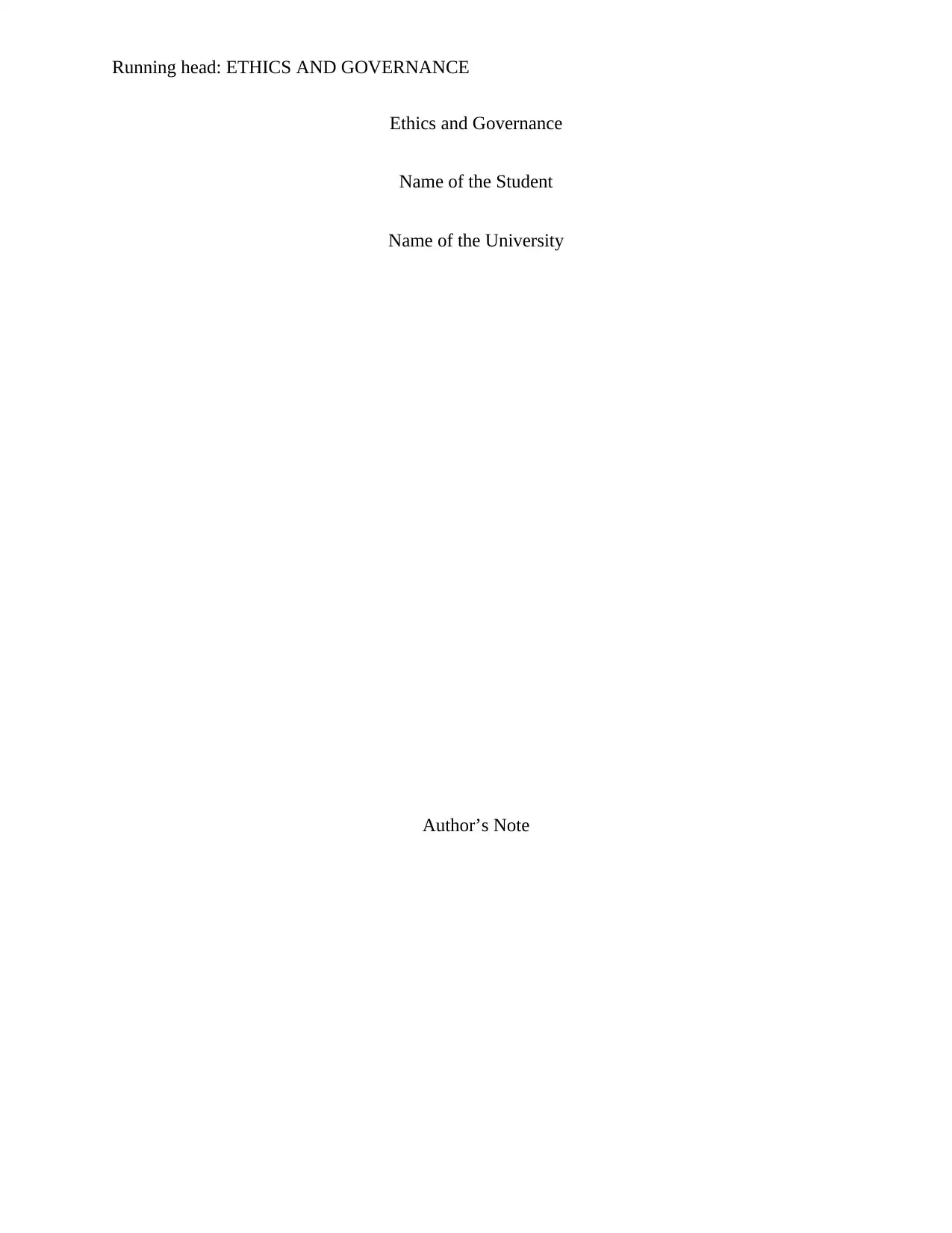
Running head: ETHICS AND GOVERNANCE
Ethics and Governance
Name of the Student
Name of the University
Author’s Note
Ethics and Governance
Name of the Student
Name of the University
Author’s Note
Paraphrase This Document
Need a fresh take? Get an instant paraphrase of this document with our AI Paraphraser
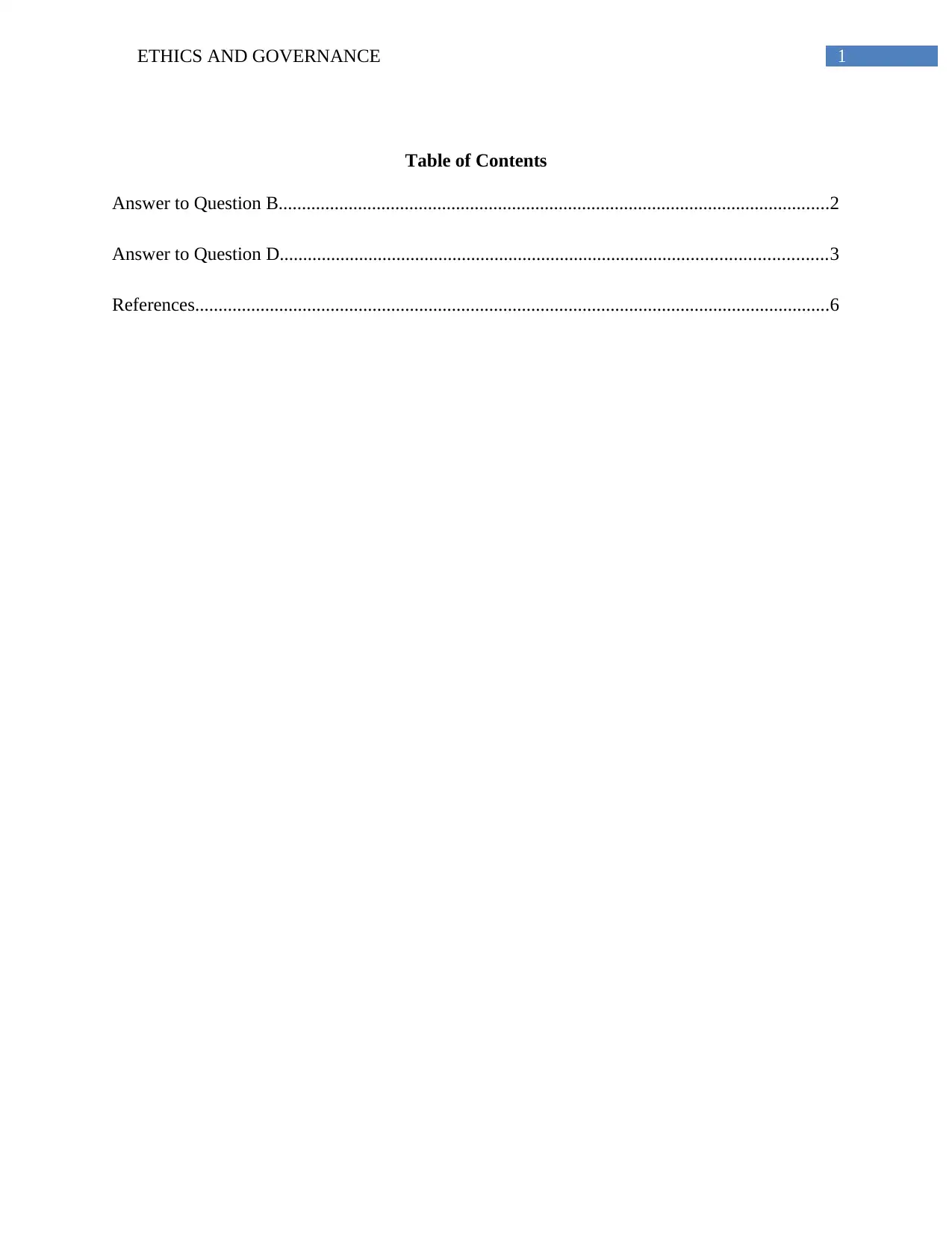
1ETHICS AND GOVERNANCE
Table of Contents
Answer to Question B......................................................................................................................2
Answer to Question D.....................................................................................................................3
References........................................................................................................................................6
Table of Contents
Answer to Question B......................................................................................................................2
Answer to Question D.....................................................................................................................3
References........................................................................................................................................6
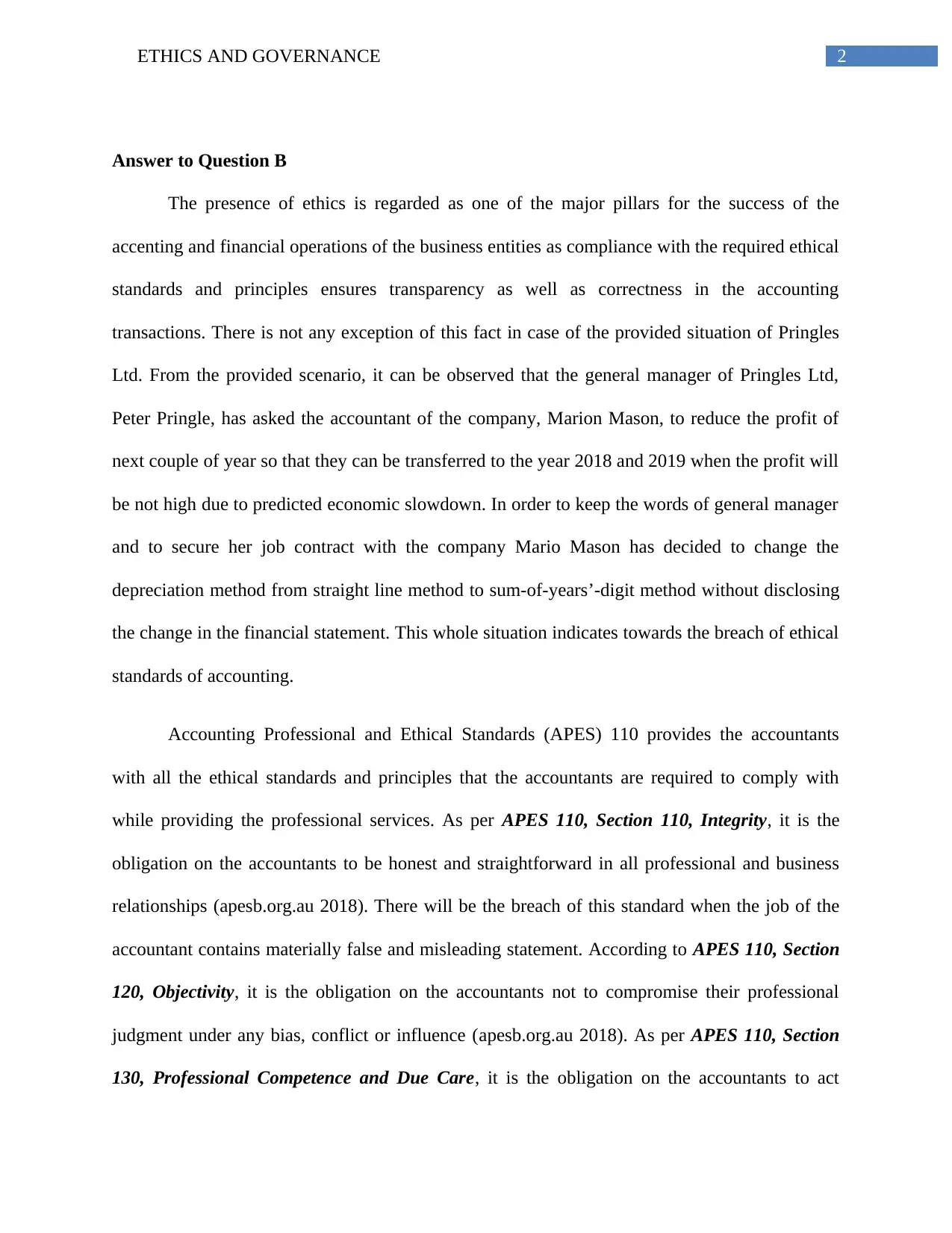
2ETHICS AND GOVERNANCE
Answer to Question B
The presence of ethics is regarded as one of the major pillars for the success of the
accenting and financial operations of the business entities as compliance with the required ethical
standards and principles ensures transparency as well as correctness in the accounting
transactions. There is not any exception of this fact in case of the provided situation of Pringles
Ltd. From the provided scenario, it can be observed that the general manager of Pringles Ltd,
Peter Pringle, has asked the accountant of the company, Marion Mason, to reduce the profit of
next couple of year so that they can be transferred to the year 2018 and 2019 when the profit will
be not high due to predicted economic slowdown. In order to keep the words of general manager
and to secure her job contract with the company Mario Mason has decided to change the
depreciation method from straight line method to sum-of-years’-digit method without disclosing
the change in the financial statement. This whole situation indicates towards the breach of ethical
standards of accounting.
Accounting Professional and Ethical Standards (APES) 110 provides the accountants
with all the ethical standards and principles that the accountants are required to comply with
while providing the professional services. As per APES 110, Section 110, Integrity, it is the
obligation on the accountants to be honest and straightforward in all professional and business
relationships (apesb.org.au 2018). There will be the breach of this standard when the job of the
accountant contains materially false and misleading statement. According to APES 110, Section
120, Objectivity, it is the obligation on the accountants not to compromise their professional
judgment under any bias, conflict or influence (apesb.org.au 2018). As per APES 110, Section
130, Professional Competence and Due Care, it is the obligation on the accountants to act
Answer to Question B
The presence of ethics is regarded as one of the major pillars for the success of the
accenting and financial operations of the business entities as compliance with the required ethical
standards and principles ensures transparency as well as correctness in the accounting
transactions. There is not any exception of this fact in case of the provided situation of Pringles
Ltd. From the provided scenario, it can be observed that the general manager of Pringles Ltd,
Peter Pringle, has asked the accountant of the company, Marion Mason, to reduce the profit of
next couple of year so that they can be transferred to the year 2018 and 2019 when the profit will
be not high due to predicted economic slowdown. In order to keep the words of general manager
and to secure her job contract with the company Mario Mason has decided to change the
depreciation method from straight line method to sum-of-years’-digit method without disclosing
the change in the financial statement. This whole situation indicates towards the breach of ethical
standards of accounting.
Accounting Professional and Ethical Standards (APES) 110 provides the accountants
with all the ethical standards and principles that the accountants are required to comply with
while providing the professional services. As per APES 110, Section 110, Integrity, it is the
obligation on the accountants to be honest and straightforward in all professional and business
relationships (apesb.org.au 2018). There will be the breach of this standard when the job of the
accountant contains materially false and misleading statement. According to APES 110, Section
120, Objectivity, it is the obligation on the accountants not to compromise their professional
judgment under any bias, conflict or influence (apesb.org.au 2018). As per APES 110, Section
130, Professional Competence and Due Care, it is the obligation on the accountants to act
⊘ This is a preview!⊘
Do you want full access?
Subscribe today to unlock all pages.

Trusted by 1+ million students worldwide
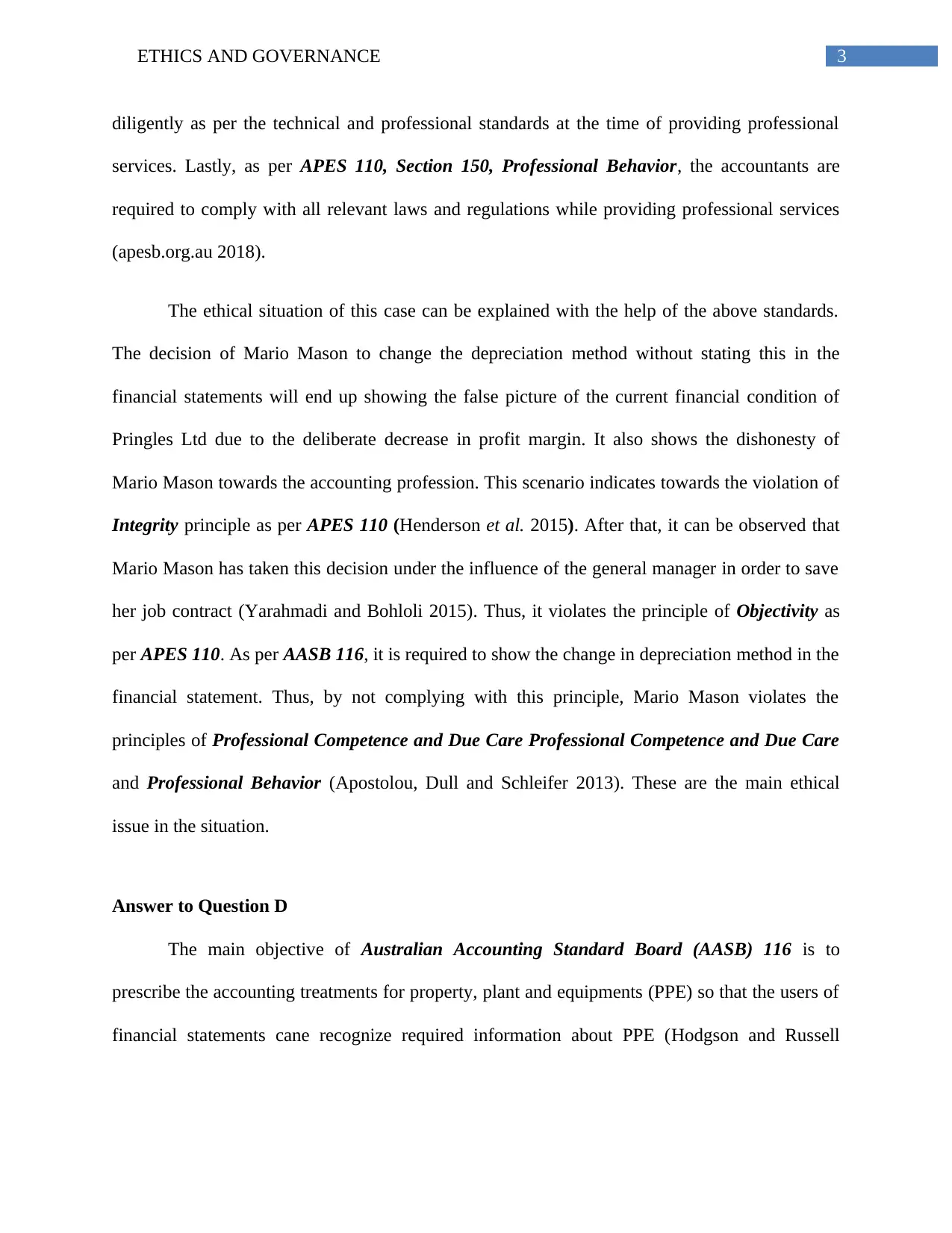
3ETHICS AND GOVERNANCE
diligently as per the technical and professional standards at the time of providing professional
services. Lastly, as per APES 110, Section 150, Professional Behavior, the accountants are
required to comply with all relevant laws and regulations while providing professional services
(apesb.org.au 2018).
The ethical situation of this case can be explained with the help of the above standards.
The decision of Mario Mason to change the depreciation method without stating this in the
financial statements will end up showing the false picture of the current financial condition of
Pringles Ltd due to the deliberate decrease in profit margin. It also shows the dishonesty of
Mario Mason towards the accounting profession. This scenario indicates towards the violation of
Integrity principle as per APES 110 (Henderson et al. 2015). After that, it can be observed that
Mario Mason has taken this decision under the influence of the general manager in order to save
her job contract (Yarahmadi and Bohloli 2015). Thus, it violates the principle of Objectivity as
per APES 110. As per AASB 116, it is required to show the change in depreciation method in the
financial statement. Thus, by not complying with this principle, Mario Mason violates the
principles of Professional Competence and Due Care Professional Competence and Due Care
and Professional Behavior (Apostolou, Dull and Schleifer 2013). These are the main ethical
issue in the situation.
Answer to Question D
The main objective of Australian Accounting Standard Board (AASB) 116 is to
prescribe the accounting treatments for property, plant and equipments (PPE) so that the users of
financial statements cane recognize required information about PPE (Hodgson and Russell
diligently as per the technical and professional standards at the time of providing professional
services. Lastly, as per APES 110, Section 150, Professional Behavior, the accountants are
required to comply with all relevant laws and regulations while providing professional services
(apesb.org.au 2018).
The ethical situation of this case can be explained with the help of the above standards.
The decision of Mario Mason to change the depreciation method without stating this in the
financial statements will end up showing the false picture of the current financial condition of
Pringles Ltd due to the deliberate decrease in profit margin. It also shows the dishonesty of
Mario Mason towards the accounting profession. This scenario indicates towards the violation of
Integrity principle as per APES 110 (Henderson et al. 2015). After that, it can be observed that
Mario Mason has taken this decision under the influence of the general manager in order to save
her job contract (Yarahmadi and Bohloli 2015). Thus, it violates the principle of Objectivity as
per APES 110. As per AASB 116, it is required to show the change in depreciation method in the
financial statement. Thus, by not complying with this principle, Mario Mason violates the
principles of Professional Competence and Due Care Professional Competence and Due Care
and Professional Behavior (Apostolou, Dull and Schleifer 2013). These are the main ethical
issue in the situation.
Answer to Question D
The main objective of Australian Accounting Standard Board (AASB) 116 is to
prescribe the accounting treatments for property, plant and equipments (PPE) so that the users of
financial statements cane recognize required information about PPE (Hodgson and Russell
Paraphrase This Document
Need a fresh take? Get an instant paraphrase of this document with our AI Paraphraser
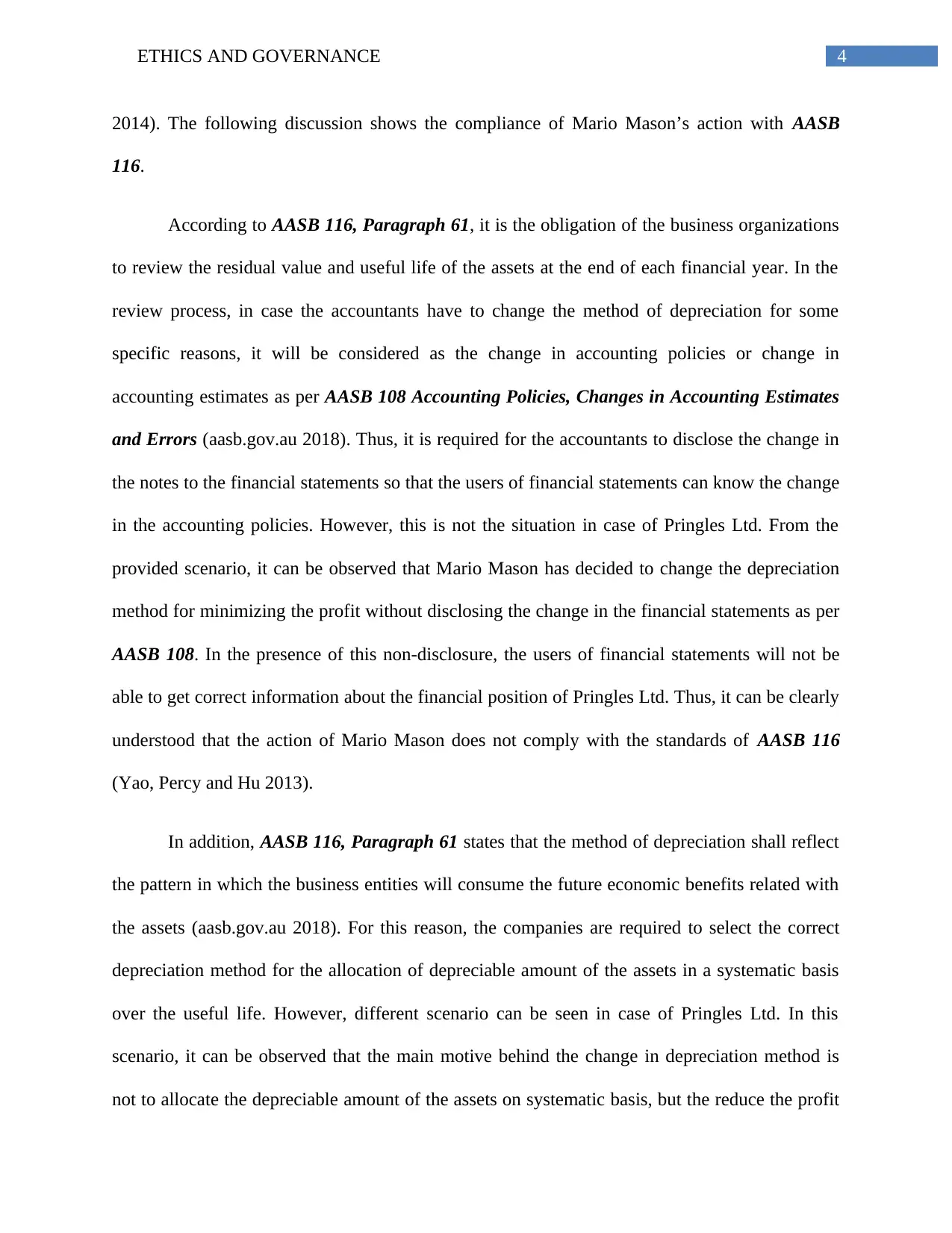
4ETHICS AND GOVERNANCE
2014). The following discussion shows the compliance of Mario Mason’s action with AASB
116.
According to AASB 116, Paragraph 61, it is the obligation of the business organizations
to review the residual value and useful life of the assets at the end of each financial year. In the
review process, in case the accountants have to change the method of depreciation for some
specific reasons, it will be considered as the change in accounting policies or change in
accounting estimates as per AASB 108 Accounting Policies, Changes in Accounting Estimates
and Errors (aasb.gov.au 2018). Thus, it is required for the accountants to disclose the change in
the notes to the financial statements so that the users of financial statements can know the change
in the accounting policies. However, this is not the situation in case of Pringles Ltd. From the
provided scenario, it can be observed that Mario Mason has decided to change the depreciation
method for minimizing the profit without disclosing the change in the financial statements as per
AASB 108. In the presence of this non-disclosure, the users of financial statements will not be
able to get correct information about the financial position of Pringles Ltd. Thus, it can be clearly
understood that the action of Mario Mason does not comply with the standards of AASB 116
(Yao, Percy and Hu 2013).
In addition, AASB 116, Paragraph 61 states that the method of depreciation shall reflect
the pattern in which the business entities will consume the future economic benefits related with
the assets (aasb.gov.au 2018). For this reason, the companies are required to select the correct
depreciation method for the allocation of depreciable amount of the assets in a systematic basis
over the useful life. However, different scenario can be seen in case of Pringles Ltd. In this
scenario, it can be observed that the main motive behind the change in depreciation method is
not to allocate the depreciable amount of the assets on systematic basis, but the reduce the profit
2014). The following discussion shows the compliance of Mario Mason’s action with AASB
116.
According to AASB 116, Paragraph 61, it is the obligation of the business organizations
to review the residual value and useful life of the assets at the end of each financial year. In the
review process, in case the accountants have to change the method of depreciation for some
specific reasons, it will be considered as the change in accounting policies or change in
accounting estimates as per AASB 108 Accounting Policies, Changes in Accounting Estimates
and Errors (aasb.gov.au 2018). Thus, it is required for the accountants to disclose the change in
the notes to the financial statements so that the users of financial statements can know the change
in the accounting policies. However, this is not the situation in case of Pringles Ltd. From the
provided scenario, it can be observed that Mario Mason has decided to change the depreciation
method for minimizing the profit without disclosing the change in the financial statements as per
AASB 108. In the presence of this non-disclosure, the users of financial statements will not be
able to get correct information about the financial position of Pringles Ltd. Thus, it can be clearly
understood that the action of Mario Mason does not comply with the standards of AASB 116
(Yao, Percy and Hu 2013).
In addition, AASB 116, Paragraph 61 states that the method of depreciation shall reflect
the pattern in which the business entities will consume the future economic benefits related with
the assets (aasb.gov.au 2018). For this reason, the companies are required to select the correct
depreciation method for the allocation of depreciable amount of the assets in a systematic basis
over the useful life. However, different scenario can be seen in case of Pringles Ltd. In this
scenario, it can be observed that the main motive behind the change in depreciation method is
not to allocate the depreciable amount of the assets on systematic basis, but the reduce the profit
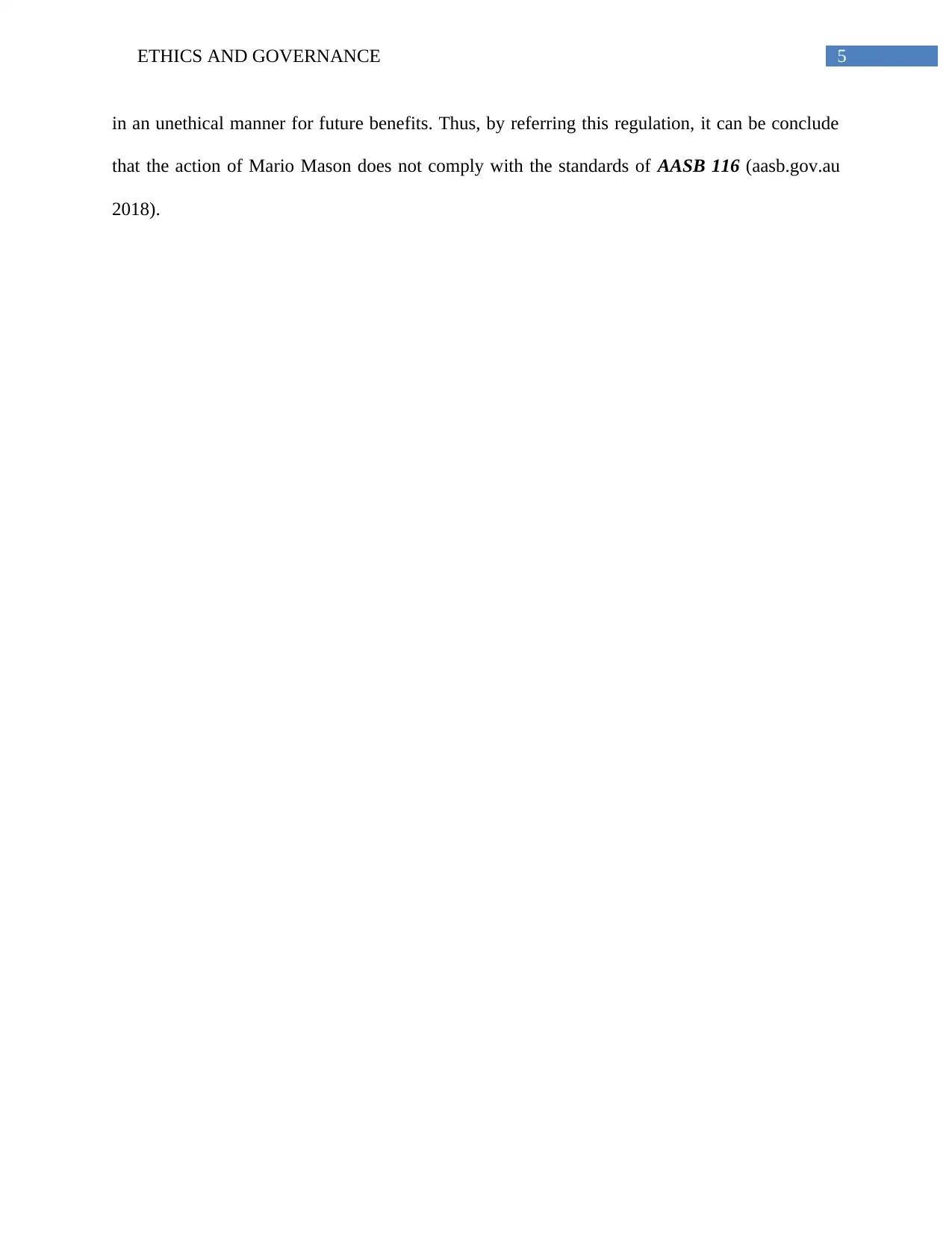
5ETHICS AND GOVERNANCE
in an unethical manner for future benefits. Thus, by referring this regulation, it can be conclude
that the action of Mario Mason does not comply with the standards of AASB 116 (aasb.gov.au
2018).
in an unethical manner for future benefits. Thus, by referring this regulation, it can be conclude
that the action of Mario Mason does not comply with the standards of AASB 116 (aasb.gov.au
2018).
⊘ This is a preview!⊘
Do you want full access?
Subscribe today to unlock all pages.

Trusted by 1+ million students worldwide
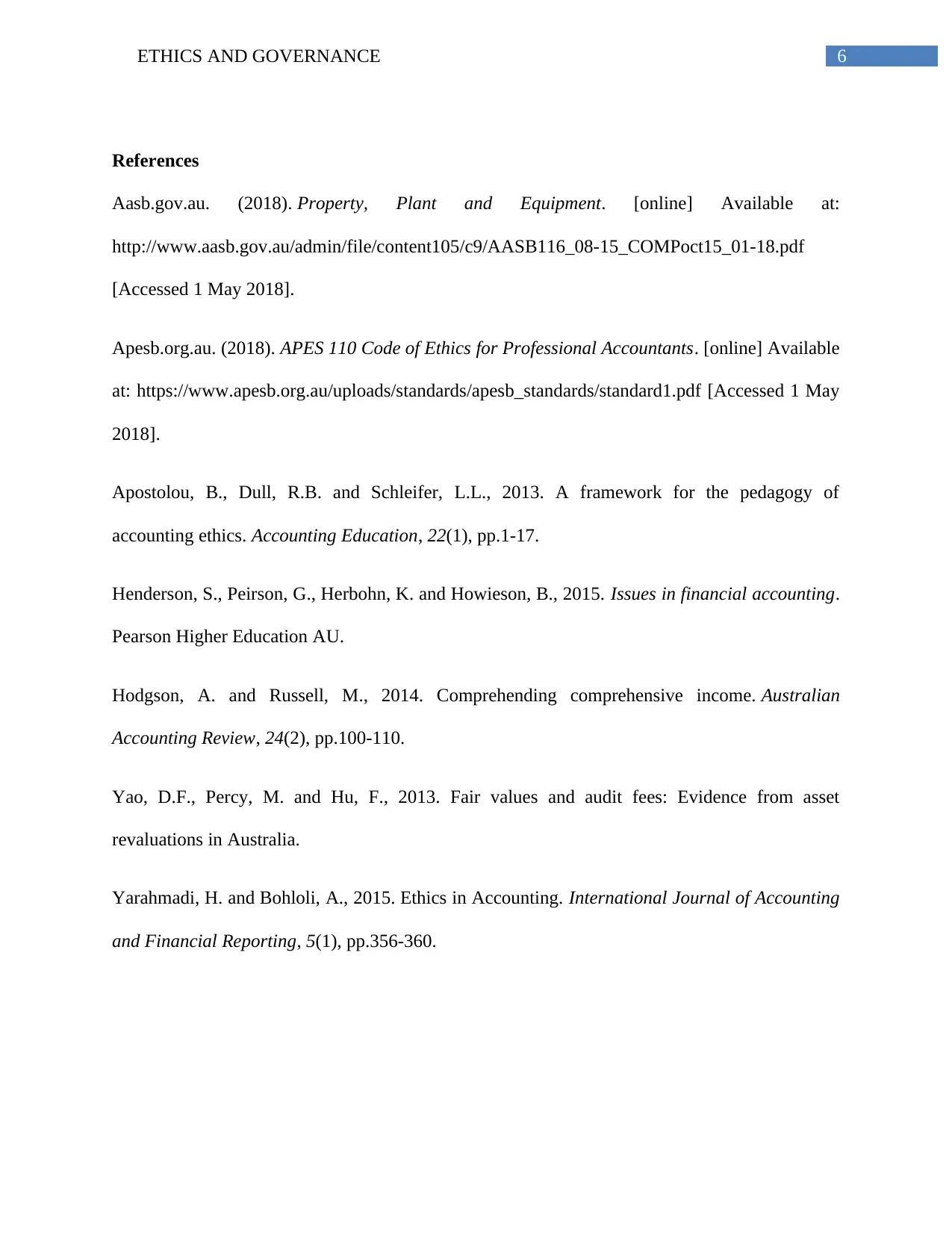
6ETHICS AND GOVERNANCE
References
Aasb.gov.au. (2018). Property, Plant and Equipment. [online] Available at:
http://www.aasb.gov.au/admin/file/content105/c9/AASB116_08-15_COMPoct15_01-18.pdf
[Accessed 1 May 2018].
Apesb.org.au. (2018). APES 110 Code of Ethics for Professional Accountants. [online] Available
at: https://www.apesb.org.au/uploads/standards/apesb_standards/standard1.pdf [Accessed 1 May
2018].
Apostolou, B., Dull, R.B. and Schleifer, L.L., 2013. A framework for the pedagogy of
accounting ethics. Accounting Education, 22(1), pp.1-17.
Henderson, S., Peirson, G., Herbohn, K. and Howieson, B., 2015. Issues in financial accounting.
Pearson Higher Education AU.
Hodgson, A. and Russell, M., 2014. Comprehending comprehensive income. Australian
Accounting Review, 24(2), pp.100-110.
Yao, D.F., Percy, M. and Hu, F., 2013. Fair values and audit fees: Evidence from asset
revaluations in Australia.
Yarahmadi, H. and Bohloli, A., 2015. Ethics in Accounting. International Journal of Accounting
and Financial Reporting, 5(1), pp.356-360.
References
Aasb.gov.au. (2018). Property, Plant and Equipment. [online] Available at:
http://www.aasb.gov.au/admin/file/content105/c9/AASB116_08-15_COMPoct15_01-18.pdf
[Accessed 1 May 2018].
Apesb.org.au. (2018). APES 110 Code of Ethics for Professional Accountants. [online] Available
at: https://www.apesb.org.au/uploads/standards/apesb_standards/standard1.pdf [Accessed 1 May
2018].
Apostolou, B., Dull, R.B. and Schleifer, L.L., 2013. A framework for the pedagogy of
accounting ethics. Accounting Education, 22(1), pp.1-17.
Henderson, S., Peirson, G., Herbohn, K. and Howieson, B., 2015. Issues in financial accounting.
Pearson Higher Education AU.
Hodgson, A. and Russell, M., 2014. Comprehending comprehensive income. Australian
Accounting Review, 24(2), pp.100-110.
Yao, D.F., Percy, M. and Hu, F., 2013. Fair values and audit fees: Evidence from asset
revaluations in Australia.
Yarahmadi, H. and Bohloli, A., 2015. Ethics in Accounting. International Journal of Accounting
and Financial Reporting, 5(1), pp.356-360.
1 out of 7
Related Documents
Your All-in-One AI-Powered Toolkit for Academic Success.
+13062052269
info@desklib.com
Available 24*7 on WhatsApp / Email
![[object Object]](/_next/static/media/star-bottom.7253800d.svg)
Unlock your academic potential
Copyright © 2020–2026 A2Z Services. All Rights Reserved. Developed and managed by ZUCOL.




